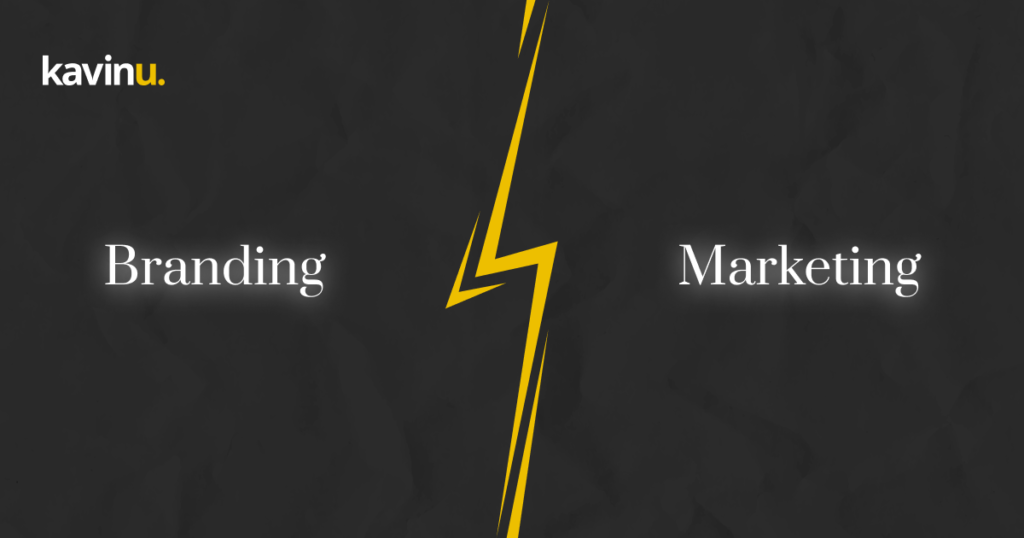
Branding Vs Marketing Understanding the Key Differences
You know, branding and marketing often get mixed up, but they’re actually two different things that play big roles in your business’s success.
When we talk about branding versus marketing, think of it like this: marketing is all about getting the word out and convincing people to buy, while branding agency is more about creating a unique personality like us for your business .
Marketing is what gets people interested in buying your stuff right now, while branding is about building a reputation and making customers want to stick with you for the long haul.
So, if all this sounds a bit confusing, don’t worry! We’ll break it down and look at Branding vs Marketing: understanding the key differences in a way that’s easy to understand.

"Design thinking is a human-centered approach to innovation that draws from the designer's toolkit to integrate the needs of people, the possibilities of technology, and the requirements for business success."
-Tim Brown
What Does Branding mean?
When we talk about branding, most people think of logos and colors, right? Well, that’s part of it, but there’s a whole lot more to it.
Branding is basically every interaction you have with a company. It’s not just about how their logo looks or what colors they use. It’s also about how they present themselves, how their products look, and even how their employees treat customers.
So, in a nutshell, branding is like the heart and soul of a company. It’s all about the values that shape how people see them.
Different Branding Types
- A) Corporate Branding: brand marketing strategy Corporate identity stands out as one of the most vital and prevalent forms of brand It revolves around the perception of a brand. When a company is viewed positively, customers are often willing to invest more in its products or services.
- B) Product Branding: Product branding entails the branding of a specific product rather than the entire company that produces it.
- C) Service Branding: Service branding emphasizes the quality of customer service being offered. Exceptional customer service plays a pivotal role in shaping a brand’s reputation.
- D) Personal Branding: Personal branding is associated with public figures such as athletes, actors, politicians, social media influencers, and singers.
What Does Marketing mean?
Marketing is basically how your business talks about itself and tries to get people interested in what you offer. It’s like using different tools and tricks to show off your brand and convince people to buy from you.
Marketing strategies keep changing based on what people think, how the economy is doing, what your competitors are up to, and even what time of year it is. They’re also tailored to different groups of people while still staying true to what your brand stands for.
Think of marketing as this big umbrella covering all sorts of things. Sometimes it’s emotional, sometimes it’s funny, and sometimes it’s serious. It can be all kinds of stuff like words, pictures, videos, or even memes.
Different Marketing Types
- A) Digital marketing – It encompasses various popular marketing and branding strategy techniques employed through digital (online) channels, including pay-per-click and social media marketing.
- B) Email marketing – It involves sending emails to both existing and potential customers with the aim of driving them towards making a purchase.
- C) Content marketing – It is often considered as a subset of digital marketing, involves businesses creating online content to showcase their products or services.
- D) Social media marketing – It is a subset of both digital and content marketing, entails creating and distributing content across social media platforms such as Facebook, YouTube, Instagram, TikTok, and Pinterest. This strategy is instrumental in boosting brand awareness.
- E) Influencer marketing – It is closely intertwined with social media marketing, utilizes online or social media personalities to endorse and promote brands and products.
Contrast between Branding vs Marketing
Both branding and marketing are crucial for a business’s success, as they both aim to show consumers that their product is the best choice out there.

Purpose Vs Execution
Branding revolves around shaping your brand’s identity, including its story, objectives, vision, and values. It addresses fundamental questions like: What defines your brand? What purpose does it serve? What value does it offer? Why should customers choose your brand?
Marketing, on the flip side, focuses on the strategies and tactics employed to consistently communicate your brand’s message to customers. It tackles queries such as: How will you promote your product? How will you drive sales?
It’s all about effectively advertising and communicating your brand, product, or services.
Take Apple, for example. Their “Why” centers on the belief that technology can be both aesthetically pleasing and user-friendly. Their “How” involves executing sleek product launches, running minimalist marketing campaigns, and creating the distinctive Apple store experience.
Timeless Vs Fleeting
Consider a local café running a short-term promotion for its coffee, swiftly driving traffic and sales – that’s the essence of marketing.
Yet, beyond these promotions, they’re also invested in brand development. They focus on creating a cozy ambiance, fostering deeper connections, and ensuring customers feel welcome.
Marketing operates as an energetic sprint, delivering timely messages about your brand, products, or services to spur immediate action and generate leads in the short run.
On the flip side, branding is a marathon. It’s akin to sowing seeds that require time to germinate into stored memories, experiences, and perceptions in consumers’ minds. It’s about cultivating enduring connections and nurturing relationships over the long haul.
Customer Loyalty Vs Driving sales
In the realm of business, marketing operates like agile sprinters, tirelessly racing towards the finish lines of sales. Whether it’s the expertise of SEO wizards, the allure of captivating content, or the brilliance of dazzling advertising, every effort is aimed at one goal: boosting sales. And indeed, that’s a fantastic outcome, isn’t it?
However, branding takes a different, more strategic approach. It’s akin to a marathon runner, pacing steadily rather than sprinting for immediate sales. Instead, branding focuses on cultivating brand recognition, nurturing positive brand sentiment, and fostering unwavering customer loyalty. While the impact may not be instant, these long-term investments have a profound effect on driving sustained sales growth over time
Engages a broad audience Vs Targets Specifics
In the dynamic landscape of business, both marketing and branding play vital roles in captivating and swaying our intended audiences.
Branding operates as a wide-reaching net cast into the expansive sea of consumer attention. Through a consistent narrative, captivating visuals, and a unique identity, it endeavors to captivate diverse audiences, encompassing not only target consumers but also potential employees and recruits.
Meanwhile, marketing adopts a precision-focused strategy akin to a finely tuned tool. Whether through targeted advertisements, personalized content, or strategic campaigns, it meticulously targets specific audience segments, ensuring our message resonates deeply and compels them to engage with our offerings.
Together, branding and marketing form a powerful duo, casting a wide net while also hitting the mark with pinpoint accuracy, ultimately driving our business forward with purpose and impact.
Shapes Customer Interaction Vs Guides the Way
Marketing metrics are akin to rapid musical notes, swiftly capturing immediate outcomes such as clicks, conversions, and leads. They zero in on individual marketing tactics, providing quick insights into performance.
In contrast, branding metrics serve as the harmonious chords in the background, offering depth and cohesion to the overall composition. They delve into what the audience perceives, measuring aspects like brand awareness, loyalty, and sentiment.
For instance, when a tech brand launches an online advertising campaign, it generates outcome metrics like click-through rates and conversion rates, indicative of marketing effectiveness. However, alongside this, the brand consistently emphasizes its commitment to innovation, monitoring metrics like brand recognition and customer loyalty to gauge long-term success.
Conclusion
To sum up, while marketing and branding share some goals, they work differently. Branding is about creating a strong identity for your company, making it stand out. Marketing focuses on promoting your products or services to reach your target customers.
Both marketing and brand marketing strategy are important for a business to succeed. It’s crucial to find the right mix of both, learn from other successful founders, and use what works best for your business.
You can also check out the comprehensive guide on UX research, which is divided into three parts:
Part – 1 Introduction to UX Research
Part – 2 Conducting UX Research
Part – 3 Applying UX Research
Elevate your UX research game with Kavinu Designs!
Our team of experienced UX designers uses the latest tools and techniques to deliver top-notch user research services. Get in touch with us today to learn more about how we can help you take your project to the next level.

